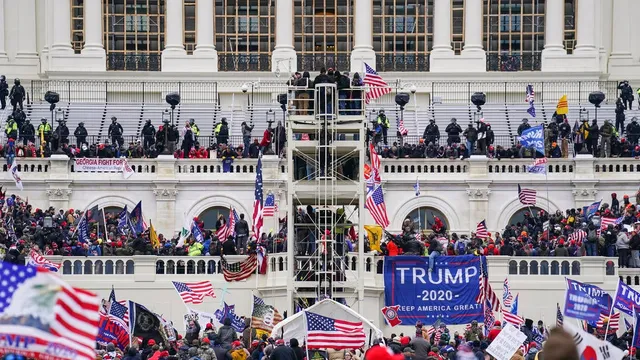
FBI agents face scrutiny over January 6 investigations amid political pressure
2025-02-06 20:02- The Trump administration distributed surveys to over 1,000 FBI agents to detail their work on January 6 investigations.
- The FBI Agents Association expressed concerns that the survey could be used to pressure agents into resigning.
- The incident highlights ongoing conflicts within the FBI and raises questions about the agency's integrity amidst political turmoil.
Express your sentiment!
Insights
In the U.S., significant scrutiny is being directed at the FBI's handling of the investigations into the January 6, 2021 Capitol riots. As part of an effort led by the Trump administration, surveys were distributed to over 1,000 FBI agents and support personnel, prompting them to disclose their roles in various aspects of the investigations. These questionnaires asked agents to provide details about their responsibilities, including whether they made arrests, led operations, or participated in interviews or trials related to the insurrection. This initiative was reportedly initiated shortly after internal memos indicated a review process for FBI agents involved in the cases, raising concerns about job security and potential political retribution. The FBI Agents Association voiced their dread over the survey, suggesting that its intent might be to steer agents towards resignation due to a hostile work environment created by the administration's agenda. Acting FBI Director Brian Driscoll endeavored to reassure staff by emphasizing that involvement in controversial investigations is not equated with professional misconduct, yet many agents are fearful of the consequences of the survey. The association's message underscored the importance of standing firm against voluntary resignations, as the atmosphere within the bureau reflects an ongoing battle for integrity amidst political influences. This situation follows broader tensions within federal law enforcement post-insurrection, illustrating the complex interplay between operational integrity and political expectations that faces FBI employees today.
Contexts
The impact of the January 6 Capitol riots on FBI investigations has been profound and multifaceted, resulting in a substantial shift in the agency's approach to domestic terrorism and extremism. Following the events of that day, the FBI intensified its focus on identifying and apprehending individuals who participated in the unrest, which was characterized by violent breaches of the Capitol building, threats toward lawmakers, and an overall deterioration of civil discourse. The agency saw a record increase in tips and leads, which allowed investigators to build intelligence-based cases against numerous offenders. Surveillance footage, social media postings, and biometric analysis became critical tools for the FBI as they sought to connect individuals to their actions during the riots and understand broader networks of extremist behavior. Moreover, the aftermath of the January 6 events compelled the FBI to reevaluate its prioritization of domestic threats in relation to foreign terrorism. The upsurge in homegrown extremism associated with right-wing militias and groups became an urgent priority for the FBI. Investigations that previously might have focused predominantly on international threats now had to incorporate a heavy emphasis on radicalization within the United States. This shift in focus was underscored by legislative and governmental calls for greater accountability and transparency regarding the handling of domestic terrorism cases. The FBI established new task forces and partnerships with local law enforcement agencies to better address the rising threats and improve information-sharing mechanisms. The landscape of FBI investigations has also changed in terms of community engagement and the use of informants. There is an increasing emphasis on establishing trust and collaboration with communities to mitigate violent extremism and prevent radicalization before it results in acts of violence. The FBI's outreach efforts aim to gather intelligence from community members who might be aware of potential threats while simultaneously addressing concerns over civil liberties and the potential for profiling. These changes reflect a broader understanding of the need for proactive measures rather than reactive responses after incidents occur. Overall, the January 6 Capitol riots served as a significant turning point for the FBI, prompting the agency to adapt rapidly to the changing landscape of domestic threats. This involved reorganizing resources, enhancing collaborative efforts, and developing new frameworks for investigating extremism within American society. The ongoing analysis of these events continues to influence FBI strategies and operations, underscoring the importance of vigilance and coordination in facing the complexities of domestic terrorism.